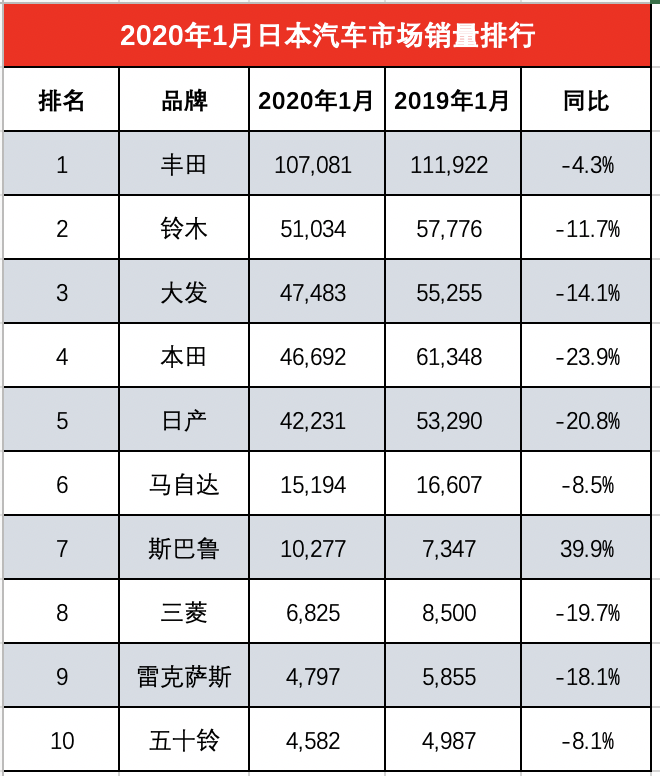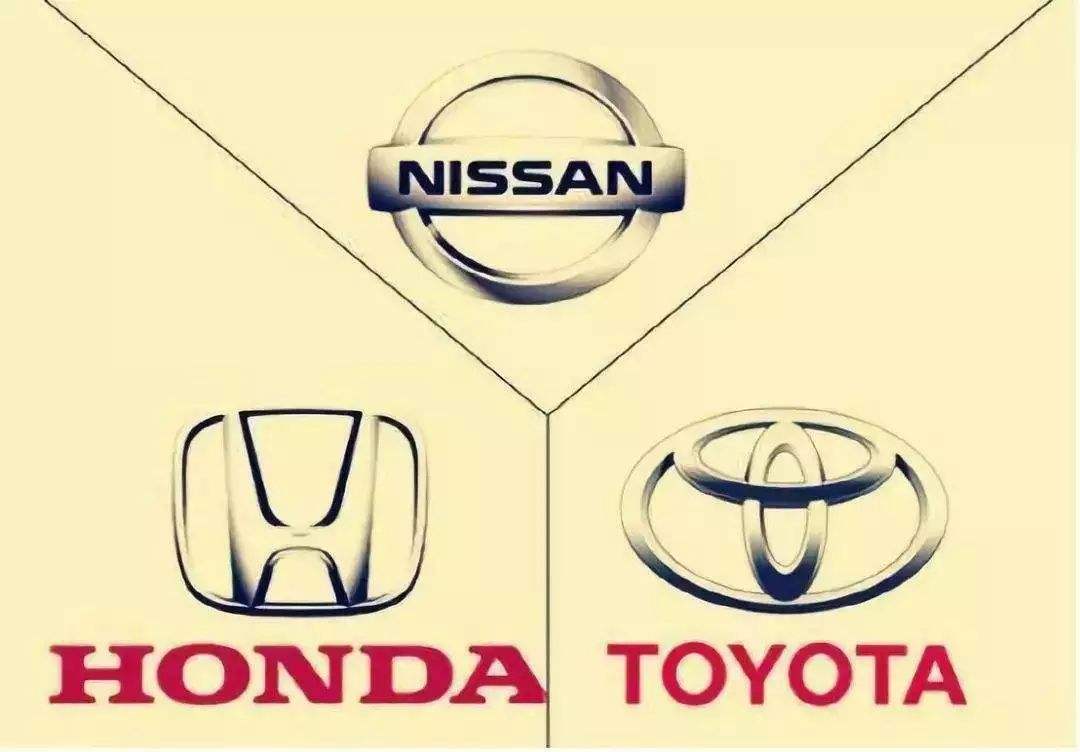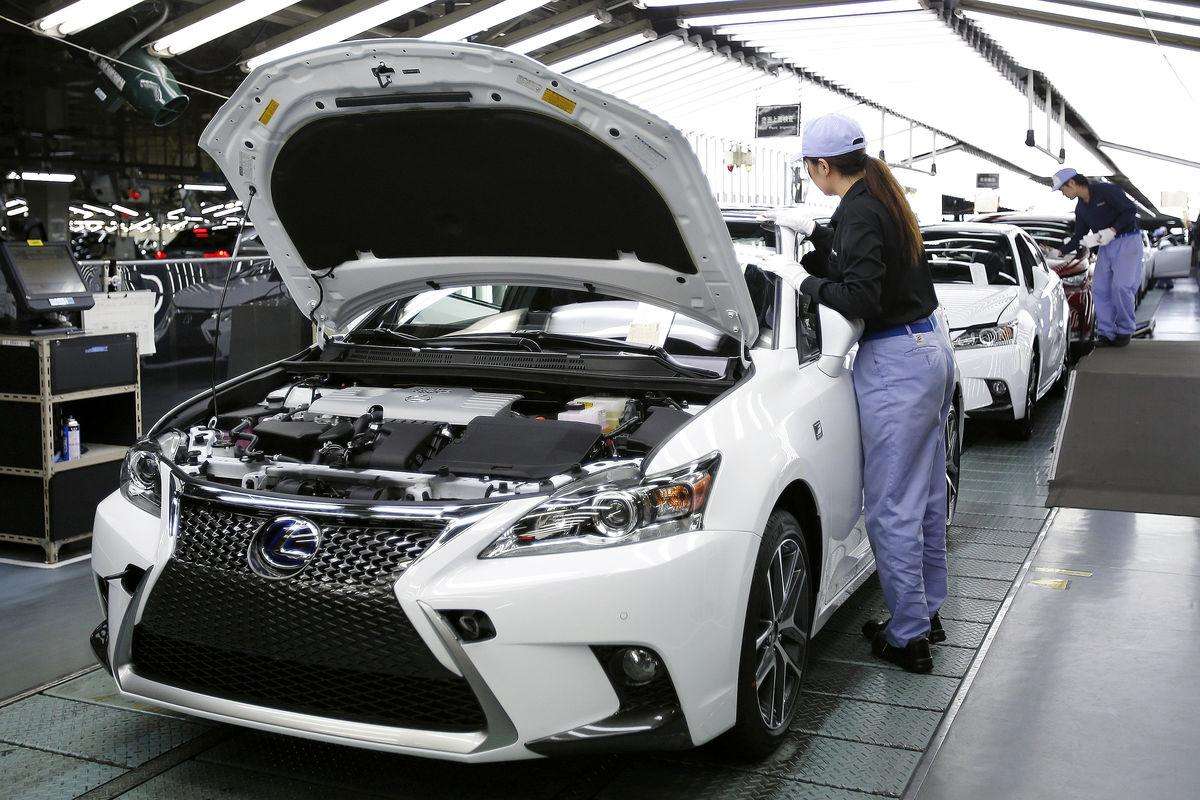In addition to Weibo, there is also WeChat
Please pay attention

WeChat public account
AutoBeta


2024-11-22 Update From: AutoBeta autobeta NAV: AutoBeta > News >
Share
AutoBeta(AutoBeta.net)02/24 Report--
When it comes to the country of Japan, it has a very high position in the automobile industry, and local brands sell well not only in Japan, but also in countries around the world. Although it develops later than German and Japanese cars, it has more than 10 million annual sales of Toyota, as well as Nissan, Honda, Suzuki and other brands that play an important role in the global market.
In addition to a large number of brands, sales in Japan's local car market are also very large. Although it is a small country with a small land area, it sells more than 5 million vehicles a year, ranking third after China and the United States.

With the passing of January, the major Japanese car companies have announced their own local sales in January. According to the sales ranking, Japan is worthy of a car power, and there are no foreign and joint venture brands in the top 10 list of local car sales. all Japanese brands. It has to be said that local consumers approve of domestic models very much.
Judging from the list of brand sales in January this year, the top 10 are Toyota, Suzuki, Daihatsu, Honda, Nissan, Mazda, Subaru, Mitsubishi, Lexus and Isuzu, all of which are local Japanese brands and are sold in the Chinese market. However, there is a certain gap in the sales volume of each brand.
In terms of specific sales, Toyota remains the highest-selling car company in Japan, selling 1.07081 billion new cars in January, the only brand to exceed 100, 000, nearly double the sales of Suzuki, Daihatsu, Honda and Nissan on the second ladder. Although Toyota, Honda and Nissan are best-selling brands in the Chinese market, it is clear that Toyota has a greater advantage in the local market.
It is not surprising for Suzuki to be in second place. Suzuki, as the "king of cars", is in line with the Japanese market with more people and less land, making it have good sales. Dafa cars, which are actually owned by Toyota, were also sold in China in the early days, but they withdrew from the Chinese market because they were not as well-known as domestic cars.

On the third ladder are the Mazda and Subaru brands, both with sales of about 10,000 vehicles. It is clear that not only in the Chinese market, Mazda and Subaru do not sell as much as the former in Japan, so that both become niche brands in the Chinese market, perhaps because of their technological obsession.
While Mitsubishi, Lexus and Isuzu brands sell less than 10,000 units in the Japanese market, because Lexus is a luxury brand, its sales are naturally less than ordinary models, but it is the best-selling luxury brand in the Japanese market. In addition to Mercedes-Benz performing better in Japan, BMW and Audi brands are both about 2000. The Isuzu brand can be seen in the domestic market, its brand mainly appears in SUV and commercial vehicles, so there are fewer household models.
Compared with Japanese brands, such as German brands such as Volkswagen and BBA, as well as American and French models, Volkswagen ranked 13th in January sales of 2827 vehicles, while Mercedes-Benz ranked 11th, with cumulative sales of 4176 vehicles, while BMW and Audi ranked 15th and 16th respectively.

In fact, judging from the sales data in January this year, the Japanese auto market also showed a sharp decline. In the top 10, only the Subaru brand grew by 40% compared with the same period last year, while the rest of the brands showed varying degrees of decline. The biggest decline was Honda, which fell 23.9% from a year earlier, while Toyota had the smallest decline, down 4.3% from a year earlier.
The main reason is the fourth consecutive month of double-digit declines in the Japanese car market since the consumption tax was raised to 10 per cent in October, compared with 24.9 per cent, 12.7 per cent and 11.0 per cent, respectively. Although the decline in January this year has shown a significant narrowing trend, but under the influence of China's novel coronavirus, the Japanese auto market is still not optimistic in the future.
According to a person in the Japanese automobile industry, the influence of novel coronavirus in Japan has not been alleviated at present, and the impact will continue in the future.
To this end, the Japanese government will also launch rescue measures. On February 20th, the Ministry of economy, Trade and Industry of Japan announced that it would jointly establish a joint committee on needle coronavirus pneumonia with the Japan Automobile Industry Association and the Japan Automobile parts Industry Commission to deal with novel coronavirus's impact on Japan's automobile industry.

According to statistics, the proportion of parts produced in China has exceeded 30% of Japanese car companies, and Japan imported about 3 billion US dollars of auto parts from China in 2019, about 10 times that of the SARS outbreak in 2003. Therefore, the impact of coronavirus on Japan's automobile industry will continue.
Welcome to subscribe to the WeChat public account "Automotive Industry Focus" to get the first-hand insider information on the automotive industry and talk about things in the automotive circle. Welcome to break the news! WeChat ID autoWechat
Views: 0
*The comments in the above article only represent the author's personal views and do not represent the views and positions of this website. If you have more insights, please feel free to contribute and share.











© 2024 AutoBeta.Net Tiger Media Company. All rights reserved.